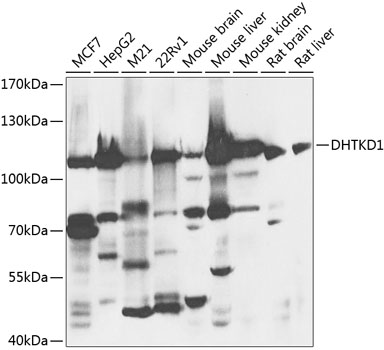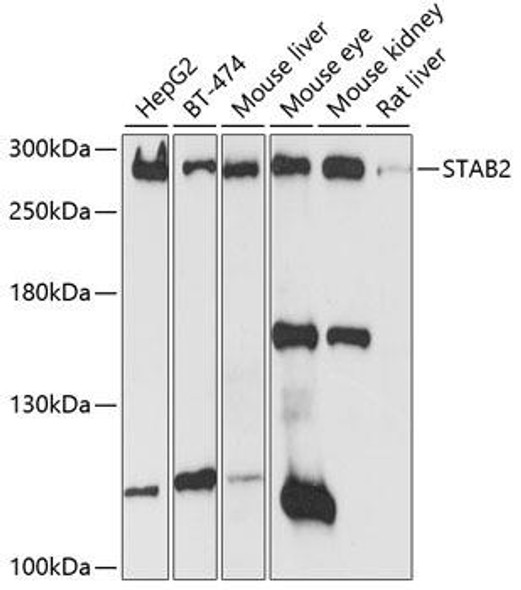Anti-DHTKD1 Antibody (CAB8369)
- SKU:
- CAB8369
- Product type:
- Antibody
- Application:
- WB
- Reactivity:
- Human
- Mouse
- Rat
- Host Species:
- Rabbit
- Isotype:
- IgG
- Research Area:
- Metabolism
Frequently bought together:
Description
| Antibody Name: | Anti-DHTKD1 Antibody |
| Antibody SKU: | CAB8369 |
| Antibody Size: | 20uL, 50uL, 100uL |
| Application: | WB |
| Reactivity: | Human, Mouse, Rat |
| Host Species: | Rabbit |
| Immunogen: | Recombinant fusion protein containing a sequence corresponding to amino acids 1-280 of human DHTKD1 (NP_061176.3). |
| Application: | WB |
| Recommended Dilution: | WB 1:500 - 1:2000 |
| Reactivity: | Human, Mouse, Rat |
| Positive Samples: | MCF7, HepG2, M21, 22Rv1, Mouse brain, Mouse liver, Mouse kidney, Rat brain, Rat liver |
| Immunogen: | Recombinant fusion protein containing a sequence corresponding to amino acids 1-280 of human DHTKD1 (NP_061176.3). |
| Purification Method: | Affinity purification |
| Storage Buffer: | Store at -20°C. Avoid freeze / thaw cycles. Buffer: PBS with 0.02% sodium azide, 50% glycerol, pH7.3. |
| Isotype: | IgG |
| Sequence: | MASA TAAA ARRG LGRA LPLL WRGY QTER GVYG YRPR KPES REPQ GALE RPPV DHGL ARLV TVYC EHGH KAAK INPL FTGQ ALLE NVPE IQAL VQTL QGPF HTAG LLNM GKEE ASLE EVLV YLNQ IYCG QISI ETSQ LQSQ DEKD WFAK RFEE LQKE TFTT EERK HLSK LMLE SQEF DHFL ATKF STVK RYGG EGAE SMMG FFHE LLKM SAYS GITD VIIG MPHR GRLN LLTG LLQF PPEL MFRK MRGL SEFP ENFS ATGD VLSH LTSS VDLY FGAH HPLH |
| Gene ID: | 55526 |
| Uniprot: | Q96HY7 |
| Cellular Location: | Mitochondrion |
| Calculated MW: | 103kDa |
| Observed MW: | 112kDa |
| Synonyms: | DHTKD1, AMOXAD, CMT2Q |
| Background: | This gene encodes a component of a mitochondrial 2-oxoglutarate-dehydrogenase-complex-like protein involved in the degradation pathways of several amino acids, including lysine. Mutations in this gene are associated with 2-aminoadipic 2-oxoadipic aciduria and Charcot-Marie-Tooth Disease Type 2Q. |
| UniProt Protein Function: | DHTKD1: The 2-oxoglutarate dehydrogenase complex catalyzes the overall conversion of 2-oxoglutarate to succinyl-CoA and CO(2). It contains multiple copies of three enzymatic components: 2- oxoglutarate dehydrogenase (E1), dihydrolipoamide succinyltransferase (E2) and lipoamide dehydrogenase (E3). Belongs to the alpha-ketoglutarate dehydrogenase family. |
| UniProt Protein Details: | Protein type:Oxidoreductase; EC 1.2.4.2 Chromosomal Location of Human Ortholog: 10p14 Cellular Component: cytosol; mitochondrial matrix; mitochondrion; oxoglutarate dehydrogenase complex Molecular Function:oxoglutarate dehydrogenase (succinyl-transferring) activity Biological Process: generation of precursor metabolites and energy; glyoxylate metabolic process; tricarboxylic acid cycle Disease: 2-aminoadipic 2-oxoadipic Aciduria; Charcot-marie-tooth Disease, Axonal, Type 2q |
| NCBI Summary: | This gene encodes a component of a mitochondrial 2-oxoglutarate-dehydrogenase-complex-like protein involved in the degradation pathways of several amino acids, including lysine. Mutations in this gene are associated with 2-aminoadipic 2-oxoadipic aciduria and Charcot-Marie-Tooth Disease Type 2Q. [provided by RefSeq, May 2013] |
| UniProt Code: | Q96HY7 |
| NCBI GenInfo Identifier: | 296434477 |
| NCBI Gene ID: | 55526 |
| NCBI Accession: | Q96HY7.2 |
| UniProt Secondary Accession: | Q96HY7,Q68CU5, Q9BUM8, Q9HCE2, |
| UniProt Related Accession: | Q96HY7 |
| Molecular Weight: | 103,077 Da |
| NCBI Full Name: | Probable 2-oxoglutarate dehydrogenase E1 component DHKTD1, mitochondrial |
| NCBI Synonym Full Names: | dehydrogenase E1 and transketolase domain containing 1 |
| NCBI Official Symbol: | DHTKD1 |
| NCBI Official Synonym Symbols: | CMT2Q; AMOXAD |
| NCBI Protein Information: | probable 2-oxoglutarate dehydrogenase E1 component DHKTD1, mitochondrial |
| UniProt Protein Name: | Probable 2-oxoglutarate dehydrogenase E1 component DHKTD1, mitochondrial |
| UniProt Synonym Protein Names: | Dehydrogenase E1 and transketolase domain-containing protein 1 |
| Protein Family: | Probable 2-oxoglutarate dehydrogenase E1 component |
| UniProt Gene Name: | DHTKD1 |
| UniProt Entry Name: | DHTK1_HUMAN |








